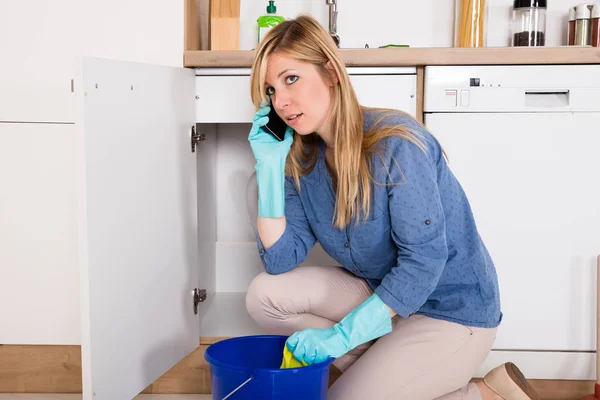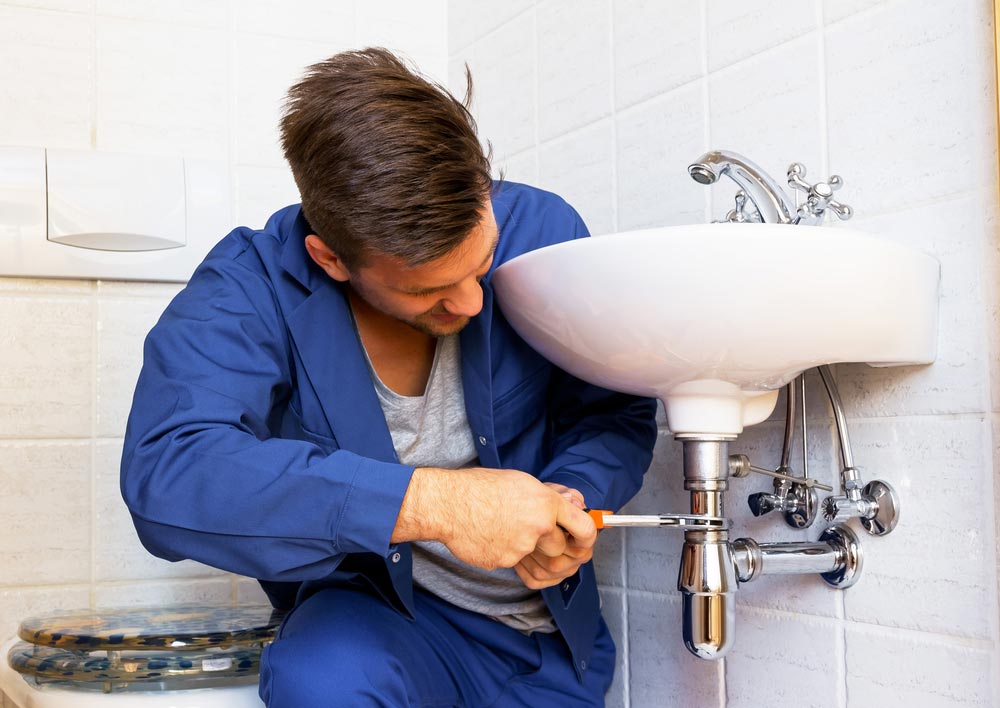The content directly below relating to Plumbing Emergencies: Tips on What To Do Before is relatively entertaining. Check it out for your own benefit and see what you think of it.

Plumbing emergencies can strike at any moment, causing stress and anxiety and possible damages to your home. Whether it's a ruptured pipe, a stopped up drain, or a leaky faucet, knowing just how to handle the situation until a specialist plumbing professional gets here can conserve you from additional complications. This article gives crucial emergency situation pipes pointers to help you mitigate damages and gain back control during a plumbing crisis.
Switch off the Water System
The initial step in any kind of pipes emergency is to shut off the water. For localized issues, such as a dripping tap or toilet, turn off the shutoff near the fixture. In the case of a significant leak or ruptured pipeline, locate your home's major water shut-off shutoff and turn it off quickly. Understanding the location of these shutoffs in advance can conserve useful time during an emergency situation.
Address Little Leaks with Momentary Repairs
Tiny leakages can quickly come to be significant issues if left unchecked. Make use of these short-term solutions up until expert help gets here:
- Pipe Tape or Epoxy Putty: Use waterproof tape or epoxy putty to momentarily seal the leakage.
- Rubber and Clamp Method: Cover a piece of rubber or an old internal tube around the leak and protect it with a hose clamp or air duct tape.
- Pails or Towels: Location pails under the leak to have water and avoid damages to flooring or furnishings.
- While these solutions aren't long-term, they can aid reduce water loss and damages.
Unclog Drains Safely
A clogged up drain can be a discouraging and unpleasant problem. Below's how to tackle it: - Utilize a Bettor: For sinks or toilets, a plunger can usually dislodge small clogs. Ensure you utilize the proper type of bettor for the component.
- Hot Water and Meal Soap: For grease-related obstructions, pour a mix of warm water and recipe soap down the drain to separate the oil.
- Avoid Chemical Drain Cleaners: While appealing, chemical cleansers can create more harm than great, specifically to older pipelines.
- If these methods don't function, stay clear of using excessive force, as it might get worse the blockage.
Manage Overflowing Toilets
An overruning commode can create immediate chaos. Right here's what you must do: - Quit the Water Circulation: Remove the tank lid and push down on the flapper shutoff to quit water from getting in the dish. Turn off the supply of water to the bathroom if needed.
- Dive Delicately: Make use of a toilet plunger to clear the blockage, yet stay clear of hostile plunging, which can cause splashing or further damage.
- Contain the Spill: Use towels or a mop to clean up water rapidly to avoid flooring damage.
Turn off Your Water Heater
In specific emergencies, such as a burst pipe, it's a good idea to turn off your water heater. This avoids overheating or damage to the device when water quits moving. Switch off the power supply to the hot water heater (electrical or gas) and allow it cool off to prevent prospective risks.
Briefly Stop a Burst Pipe
A ruptured pipeline can bring about considerable water damages in minutes. To reduce the concern:
- Clamp or Cover the Pipeline: Utilize a pipe clamp, rubber, or duct tape as a temporary seal.
- Divert Water Circulation: When possible, divert the water into a bucket or container to restrict damage to surrounding areas.
- Maintain the Location Dry: Use towels or a wet/dry vacuum to remove standing water.
- Call a specialist plumbing professional promptly to attend to the issue permanently.
Take Care Of Frozen Piping Very Carefully
In chillier climates, icy pipes are a common emergency situation. If you presume a frozen pipe: - Switch off the Water: Turn off the main water supply to stop a ruptured pipe.
- Thaw Gradually: Utilize a hairdryer, heating pad, or cozy towels to thaw the pipe gradually. Stay clear of open flames or extreme warmth, as these can damage the pipe.
- Check for Leaks: Once the pipeline is defrosted, check for splits or leaks before transforming the water back on.
Avoid More Damages
Taking quick activity to reduce damages can conserve you time and money in the future. Here's just how:
- Move Valuables: Get rid of furniture, electronic devices, and various other items from the afflicted area.
- Usage Sandbags: For flooding scenarios, area sandbags around the area to reroute water.
- Turn off Power: If water has gotten to electrical outlets or appliances, shut off the electricity to avoid shocks or fires.
. Have an Emergency Pipes Kit
Prepare a fundamental pipes emergency package to deal with small issues properly. Your kit must include:
- Flexible wrench
- Plumber's tape
- Pipe secures
- Towels and rags
- A bettor
- Epoxy putty
- Bucket.
- Having these tools accessible can make a significant distinction in your capacity to handle emergency situations.
Know When to Call a Professional.
While quick fixes can assist momentarily, certain plumbing concerns require instant specialist attention. Call a plumbing technician if:. - A ruptured pipe triggers considerable flooding.
- Drains or bathrooms continue to be clogged in spite of your initiatives.
- You notice persistent leakages or water stress issues.
- Your water heater is leaking or malfunctioning.
- Without delay contacting a professional ensures the issue is fixed properly and protects against more complications.
Conclusion.
Plumbing emergencies can be frustrating, yet with the right knowledge and tools, you can manage the circumstance successfully till aid gets here. By turning off the water supply, dealing with little leaks, and utilizing momentary solutions, you can decrease damages and maintain your home safe. Remember, these tips are temporary services; always speak with a certified plumbing to deal with the source of the issue. Preparation and quick thinking are your best allies in any plumbing emergency.
Expert Tips for Emergency Plumbing Repairs
Plumbing emergencies can be incredibly stressful and inconvenient. Whether it’s a burst pipe, a clogged drain, or a leaky faucet, these common plumbing emergencies need immediate attention to prevent further damage to your home. But before you panic, it’s important to understand the basics of plumbing repairs and the steps you can take to address these emergencies. In this article, we will share some expert tips to help you navigate through these situations and minimize potential water damage.
Identifying Common Plumbing Emergencies
- Leaky pipes and faucets
- Clogged drains and toilets
- Burst pipes
- Low water pressure
- Water heater problems
Essential Tools for Plumbing Repairs
- Plunger: Useful for unclogging toilets and drains
- Adjustable wrench: Needed for tightening or loosening nuts and bolts
- Pipe wrench: Ideal for gripping and turning pipes
- Tape measure: Necessary for accurate pipe measurements
- Plumber’s tape: Helps create watertight seals
Understanding Emergency Plumbing Services
Emergency plumbing services are designed to provide immediate assistance for unexpected plumbing issues that can cause significant damage to your home, business, or health. These services are typically available 24/7 and are staffed by experienced plumbers who can quickly diagnose and repair a wide range of plumbing problems.
When a plumbing emergency strikes, time is of the essence. Whether it’s a burst pipe flooding your basement or a gas leak posing a serious risk, emergency plumbing services ensure that help is just a phone call away. These professionals are equipped with the tools and expertise to handle any situation, minimizing damage and restoring your plumbing system to proper working order.
What Constitutes a Plumbing Emergency?
- Burst pipes or water supply lines: These can cause extensive water damage and need immediate repair to prevent flooding.
- Gas leaks or suspected gas leaks: Gas leaks are extremely dangerous and require prompt attention to avoid potential explosions or health hazards.
- Sewer backups or overflows: These can lead to unsanitary conditions and significant property damage.
- Clogged drains or toilets causing water to overflow: Overflowing water can damage floors, walls, and other structures.
- Leaks or water damage causing structural damage: Persistent leaks can weaken the structural integrity of your home or business.
- No hot water or heating: A lack of hot water can be more than an inconvenience, especially in colder months.
Common Causes of Plumbing Emergencies
- Aging or corroded pipes: Over time, pipes can deteriorate, leading to leaks or bursts.
- Improperly installed or maintained plumbing fixtures: Faulty installations or lack of maintenance can result in unexpected failures.
- Tree roots or other debris infiltrating your sewer line: Roots can grow into pipes, causing blockages and backups.
- Frozen pipes or water supply lines: In colder climates, pipes can freeze and burst, leading to significant water damage.
- High water pressure or sudden changes in water pressure: Excessive pressure can strain pipes and fixtures, causing them to fail.
- Natural disasters such as floods or earthquakes: These events can disrupt your plumbing system and cause severe damage.
Steps to Minimize Water Damage
- Locate the water shut-off valve: Knowing where the valve is can help you quickly cut off the water supply to the affected area.
- Turn off the water heater: If there’s a risk of water coming into contact with the heating element, make sure to turn off the water heater to avoid potential accidents.
- Open faucets and drain pipes: By opening faucets and drain pipes, you can relieve pressure and empty any standing water.
- Collect and contain water: Use towels, buckets, or bins to collect water and prevent it from spreading to other areas of your home.
https://leecountyplumbingandwellservice.com/expert-tips-for-emergency-plumbing-repairs/

Do you appreciate reading about What to Do During a Plumbing Emergency? Create feedback below. We will be delighted to hear your reactions about this blog. In hopes that you visit us again in the future. Feel free to take a moment to share this content if you enjoyed it. We value reading our article about Plumbing Emergencies: Tips on What To Do Before.
Call Today
Comments on “Emergency Solutions to Use Until Professional Help Arrives”